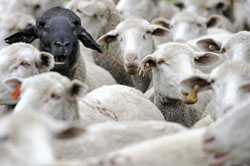Contributed by Aaron Matson, location Toronto, SD
Warm-up Questions
What do you know about sheep and shepherds? What images and thoughts come to mind when you hear those words?
Feeling a Little Sheepish
 The images of God (and Jesus) as a good shepherd and God’s people as sheep are fairly common in the Bible. Because sheep and shepherds were so common in the ancient world, this imagery painted a vivid picture of God’s relationship with God’s people to the early audiences of the Bible.
The images of God (and Jesus) as a good shepherd and God’s people as sheep are fairly common in the Bible. Because sheep and shepherds were so common in the ancient world, this imagery painted a vivid picture of God’s relationship with God’s people to the early audiences of the Bible.
Because sheep and shepherds aren’t a large part of our culture, we can have a hard time understanding what it means to say we are sheep and that Jesus is our good shepherd. Maybe the only image of sheep you have is of cute, fluffy creatures which you count when you can’t sleep. Maybe you think shepherding would be a nice, peaceful life, watching cute creatures do cute things.
The thing is, sheep are smelly, stubborn animals and shepherding is a dirty, hard job. Sheep are herd animals, and unquestioningly follow the herd where it goes. They are easily influenced, and “led astray” by a dominant member of the herd. They hate being sheared, even though it’s necessary for their own health. Shepherding means shearing the sheep, even though they hate it. If their wool gets too heavy, they fall over, can not get back up, and eventually die. Left unguarded they are easy prey for predators. Sheep require constant attention and care–or they wander off, get into food that is bad for them, and fall victim to wolves or coyotes.
Discussion Questions
- How do you feel about being called a sheep now?
- What does it mean to be called a sheep?
- What does it mean to call Jesus a shepherd?
Scripture Texts (NRSV) for Sunday, April 29, 2012 (Fourth Sunday of Easter)
(Text links are to Oremus Bible Browser. Oremus Bible Browser is not affiliated with or supported by the Evangelical Lutheran Church in America. You can find the calendar of readings for Year C at Lectionary Readings.)
For lectionary humor and insight, check the weekly comic Agnus Day.
Gospel Reflection
After learning about sheep, we might not like being called sheep very much. But we can be like sheep sometimes, can’t we? We can be pretty stubborn. We can follow along with the rest of the “herd” without question, whether or not the herd is going the right way. We often resist doing the things that are good for us if they seem unpleasant. Without people who care for us, we may fall into doing things that are bad for us and fall victim to predators who take advantage of us. We are too much like sheep for comfort.
The good news is that we have a Good Shepherd in Jesus Christ to watch over us and protect us. Jesus loved us, his sheep, so much that he gave up his life for us on the cross, and then rose again to conquer death for us once and for all.
And we, who have been made the Good Shepherd’s sheep, recognize our shepherd’s voice. There is a lot of static and noise in the world. There are a lot of distractions, worries, and troubles, and a lot of other voices which shout at us to gain our attention and loyalty. There are a lot of things in the world which try to be our shepherd. But we have the promise from Jesus that through all of the noise we will know his voice. Not because we are smart enough, pure enough, or good enough to tell which voice is his, but because Jesus is our shepherd.
In those times when you are lost (and I’m sorry to say, there will be times in your life, when no matter how much love and support you are surrounded by, you will be truly lost), remember that you are the sheep of a Good Shepherd. We are the sheep of a shepherd who loves us, no matter how stubborn or smelly we are, or how lost we are. Our shepherd isl always with us, calling to us, offering us peace, forgiveness, and new life. Nothing–not heights nor depths, not despair or heartbreak, not angels or demons, not even death itself—can separate you from the love of your Good Shepherd.
Discussion Questions
- What are some of those voices that compete for our attention and want us to follow them instead of Jesus?
- How can we help each other listen for our Shepherd’s voice?
Activity Suggestions
- See how many references you can find in the Bible to God or Jesus as a “shepherd” and the people as “sheep.”
- Look at your congregation’s hymnals and see how many hymns talk about us as “sheep” and God or Jesus as a “shepherd.” If possible, sing one of them.
- Invite someone who raises sheep to come and speak to your group about what it’s like to raise sheep. If a member of your group has experience raising sheep, have them talk about it. If you can’t find someone who raises sheep, it might also work to invite someone who raises other kinds of livestock to talk about how much time and effort it takes.
Closing Prayer
Heavenly Father, thank you for sending your Son, Jesus Christ, to be our Good Shepherd. Continue to guide us so that we might not go astray, and watch over us and protect us from all harm and evil. Help us to show your love and care to others, that all may know you as their Good Shepherd. Amen.
